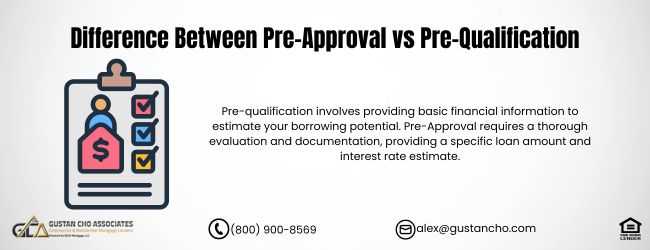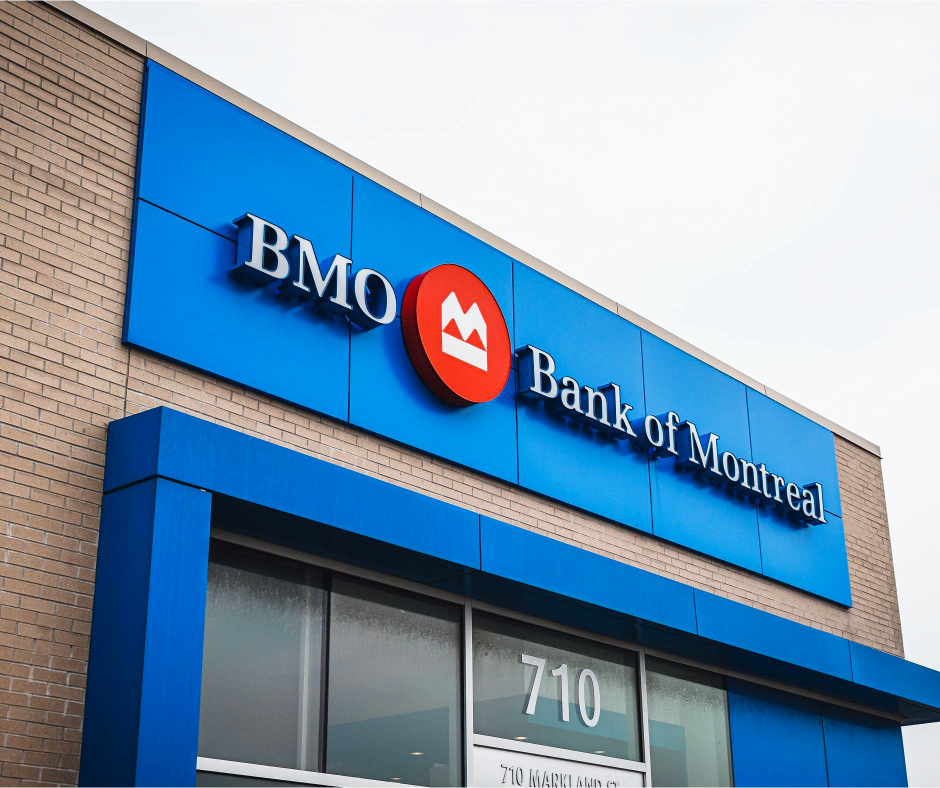Difference Between Pre-Approval vs Pre-Qualification

This guide covers the difference between pre-approval vs pre-qualification on home loans. Homebuyers can go to Gustan Cho Associates and click on the FAST QUOTE icon on the top RIGHT section and complete and submit the questionnaire, they have started the pre-qualification process. FAST QUOTE is a simple one-page questionnaire mortgage applicant completes.
Once the questionnaire form is completed, a loan officer will get alerted and connect with the mortgage applicant. The difference between pre-approval vs pre-qualification is the pre-qualification is more a general and not intense like a pre-approval.
A loan officer will qualify the borrower over the phone. The loan officer will ask the mortgage applicant certain questions with regards to income, credit, debt, and public records. Once borrower is pre-qualified, they can proceed to the next phase of the mortgage process which is the pre-approval process. In this article, we will discuss and cover the difference between pre-approval vs pre-qualification.
Starting Pre-Approval Mortgage Process
To get pre-approved with Gustan Cho Associates, borrowers need to click the APPLY NOW icon on the top right and complete the four-page online secured mortgage loan application. Once they complete and submit the online mortgage loan application, they will be contacted. Whether myself or one of my loan officers will go through the loan application and get the pre-approval mortgage process started. When you’re entering the home-buying process, understanding the difference between mortgage pre-approval and pre-qualification can set you on the right path:
Pre-Qualification Mortgage Process
Pre-qualification is generally the first step in the mortgage process. It’s a basic review of your financial situation based on the information you provide to the lender, such as your income, assets, debts, and sometimes a credit check. Here are key points about pre-qualification. An informal assessment gives you an idea of how much you might afford to borrow but does not include an analysis by the lender. It can often be done online or over the phone and usually costs nothing. Since the information is not thoroughly verified, the amount you might qualify for can change once your financial data is fully reviewed. Speak With Our Expert for qualify for mortgage process
Pre-Approval vs Pre-Qualification Mortgage Process
Pre-approval is a more in-depth process where the lender reviews your financial background and credit rating to determine a specific mortgage amount you’re eligible for. In this section, we will cover the key aspects of pre-approval. The pre-approval mortgage process involves filling out a mortgage application and providing documentation like pay stubs, tax returns, and bank statements. During the pre-approval mortgage process, a tri-merger hard credit pull is required, which may slightly affect your credit score. A pre-approval gives you a better idea of the interest rate you will be charged and shows sellers that you are a serious buyer with financing already in place.
Key Differences Between Pre-Approval vs Pre-Qualification
Pre-approval offers more certainty about the amount you can borrow because it involves thoroughly checking your financials. Pre-approval usually comes with a letter stating the approved loan amount, which can be useful in competitive real estate markets to show sellers that your offer is solid. Pre-approval letters are typically valid for 60 to 90 days, indicating the recent financial check.
Which Should You Choose Between Pre-Approval vs Pre-Qualification
While pre-qualification can be a quick way to estimate how much you can borrow, pre-approval is generally recommended when you’re serious about buying a home. It strengthens your buying position and helps you identify any financial issues you need to address early in the home-buying process. For those ready to start house hunting, obtaining a pre-approval is advisable as it gives you and the seller confidence that the deal will go through. Pre-approval for your mortgage loan, click here
Key Difference Between Pre-Approval vs Pre-Qualification
There is a difference between pre-Approval vs pre-qualification. Loan officers will run credit, review tax returns and W2s. Go over the borrower’s past 30 days paycheck stubs, and run the file through the Automated Underwriting System prior to issuance of pre-approval. The difference between pre-approval vs pre-qualification is with a pre-approval, the borrower is ready to enter into a real estate purchase contract. Whether it is a purchase or refinance, the process is the same.
Qualifying Borrower and Co-Borrowers
The loan officer will go over the basic income and expense of borrower, as well as the co-borrower: We will be going over credit situation and assets as well as liabilities. I will then tell you what you qualify for and the basic terms and rates. Borrowers will know whether you qualify for a mortgage with a prior bankruptcy or foreclosure or whether they need to wait. If the borrower’s credit is bad or does not have qualifying credit scores, they will be advised on how to repair and boost credit scores.
Qualifying For Mortgage With Judgments and Tax Liens
Borrowers with judgments, the loan officer will instruct on how to negotiate the judgment or make payment arrangements in order to qualify for a mortgage: Loan officers can help borrowers correct errors on credit report. Borrowers can qualify for a mortgage with judgments and outstanding tax liens. Need written payment agreement from judgment creditor or the IRS. Need three months of timely payments started and seasoned.
Waiting Period Mortgage Guidelines After Bankruptcy and Foreclosure
There are mandatory waiting periods to qualify for home loans after bankruptcy and/or foreclosures: There is a waiting period of 2 years for folks who filed bankruptcy from the discharged date of Chapter 7 Bankruptcy. Borrowers who just filed bankruptcy can start re-establishing their credit. Homebuyers under a Chapter 13 Bankruptcy Repayment period can qualify for FHA LOANS one year into their Chapter 13 Repayment period with Trustee approval. There is no waiting period to qualify for FHA loans after Chapter 13 Bankruptcy discharged date.
Qualifying For Mortgage After a Housing Event
Homebuyers who had a prior foreclosure, short sale, or deed in lieu of foreclosure, there are mandatory wait periods on government and conventional loans. There is a waiting period of 3 years from the date the deed of the foreclosed home was transferred out of your name to the bank’s name or the date of the sheriff’s sale on FHA and USDA loans. VA requires a 2-year waiting period. conventional loans is 7 years after standard foreclosure. There is a four year waiting period after a deed-in-lieu or short sale to qualify for conventional loans. There are no waiting period requirements on non-QM loans after housing event or bankruptcy. Click here to qualify for mortgage after a housing event
Recorded versus Surrender Date on Prior Housing Event
The deed transfer date is extremely important: Just because homeowners turned keys in and got a receipt by a lender does not mean that is the date of the foreclosure and the clock started ticking. The wait period clock starts ticking from the date of the official transfer of the deed out of the name of the borrower and to the name of the lender or the new owner of the property. There are so many cases where the homeowner turns in keys and their home is foreclosed but the bank is in no hurry to transfer the deed to their name. It might be five years before the bank transfers the deed. The 3-year waiting clock starts ticking at the 5-year mark.
The Difference Between Pre-Approval vs Pre-Qualification on Mortgage Approval
Once homebuyers are pre-qualified for a loan, the next step is to get pre-approved if they are planning on purchasing a home. There is no reason why borrowers who are issued a pre-approval not to close on their home loan. The final step of the mortgage process is clear to close which means that the lender is ready to prepare closing docs and fund the loan.
The main reason for last-minute mortgage loan denial or stress during the mortgage process is due to the fact that the loan officer did not properly qualify borrowers.
Most residential loans close in 30 days or less after the borrower has signed the disclosures. With a constant stream of new lending guidelines, volatile mortgage rates and tightening regulation from Washington, very few real estate agents will show new homes to a potential home buyer without at least a pre-approval letter.
Benefit of Pre-Approval vs Pre-Qualification
 It states the loan amount and rates and terms the borrower is qualified for and the type of loan program: FHA, VA, USDA, CONVENTIONAL, NON-QM, JUMBO, INVESTMENT HOME LOAN. It gives borrowers estimate of what the total monthly housing payment will be, which includes taxes, insurance, and homeowner association dues if any. Submitting a strong “Pre-Approval” letter with a purchase offer will let the seller know you are a serious and strong buyer and will take your offer seriously and start the negotiation process.
It states the loan amount and rates and terms the borrower is qualified for and the type of loan program: FHA, VA, USDA, CONVENTIONAL, NON-QM, JUMBO, INVESTMENT HOME LOAN. It gives borrowers estimate of what the total monthly housing payment will be, which includes taxes, insurance, and homeowner association dues if any. Submitting a strong “Pre-Approval” letter with a purchase offer will let the seller know you are a serious and strong buyer and will take your offer seriously and start the negotiation process.
Common Loan Pre-Approval Documents Required
In order to start the mortgage process, there are certain documents that are required. Here is a list of documents required to process mortgage.
Income / Assets for Wage Earner
- Last 2 year W2s and Tax Returns
- 2 most recent Pay Stubs
- 2 most recent Bank Statements, 401(K), Liquid Assets, Investment Accounts
Income / Assets for Self-Employed
- Last 2-year Tax Returns – Business and Personal
- Last Quarter P&L Statement
Letter of Explanation For
- Employment Gap or New Line of Work.
- Late Payments / Judgments / Bankruptcy on Credit Report.
Other Documents Needed
- Bankruptcy Discharge is it applies to the borrower
- Foreclosure paperwork if it applies to the borrower
- Child Support Documentation if it applies to the borrower
- Lease Agreements if you have investment rental income
- Mortgage Payment Statements if you own other residential or investment properties
Ask a lot of questions and make sure your loan officer is available at all times
Borrowers need to feel comfortable with communicating with your loan officer. Borrowers should ask your loan officer as many questions as possible. A loan officer should be available 7 days a week and should always promptly return all of your calls. Loan officers are extensively regulated and the majority of licensed mortgage loan originators will act on the client’s best interest. If you are looking to obtain a home purchase loan or a refinance loan, feel free to contact us at 800-900-8569 or text for faster response. Or email us at gcho@gustancho.com. We are available 7 days a week. Speak With Our Expert for qualify for your mortgage enquiry
FAQs: Difference Between Pre-Approval vs Pre-Qualification
- What is the difference between pre-approval and pre-qualification? Pre-qualification involves providing basic financial information to estimate your borrowing potential. Pre-Approval requires a thorough evaluation and documentation, providing a specific loan amount and interest rate estimate.
- How can I start the pre-qualification process with Gustan Cho Associates? Visit the Gustan Cho Associates website and select the “FAST QUOTE” icon in the top right corner. After that, fill out and send in the one-page questionnaire. Following this, a loan officer will contact you to review your financial information and provide pre-qualification.
- How do you get pre-approved for a mortgage with Gustan Cho Associates? To start your mortgage loan application with Gustan Cho Associates, click the “APPLY NOW” button at the top right of their website. Next, complete the secure four-page online mortgage application. Once you’ve submitted your application, a loan officer will assess it and contact you to begin the pre-approval process.
- How do you get pre-approved for a mortgage with Gustan Cho Associates? To apply, click on the “APPLY NOW” icon at the top right section of the Gustan Cho Associates website and complete the four-page online secured mortgage loan application. After submission, a loan officer will review your application and initiate the pre-approval process by contacting you.
- Why should I choose pre-approval over pre-qualification when buying a home? Getting pre-approved for a loan provides a more accurate estimate of the borrowing amount by verifying your financial information. It also provides you with a competitive advantage when dealing with sellers. It assists in recognizing and resolving any financial concerns at the beginning of the home-purchasing journey.
- What documents are required for pre-approval? For wage earners, you must provide the last two years of W-2s, tax returns, and your two most recent pay stubs. Additionally, you should include your two most recent bank statements and other asset statements, such as those from 401(k) and investment accounts. If you are self-employed, the required documents include the last two years of business and personal tax returns and a recent profit and loss statement. Additional documents that may be necessary include an explanation for any employment gaps or changes in your line of work, documentation for any late payments, judgments, or bankruptcies on your credit report, and child support documentation, if applicable. Also, you have income from investment rentals. In that case, lease agreements and mortgage payment statements for any other properties you own will be needed.
- What should I expect during the pre-approval process? A loan officer will carefully examine your financial details and credit history. They will also conduct a comprehensive credit check from three major credit bureaus, which might have a minor impact on your credit score. After this, you will be issued a pre-approval letter outlining the loan amount, interest rate, and terms for which you are eligible.
- How long is a pre-approval letter valid? Pre-approval letters usually remain effective for a period of 60 to 90 days.
- Can I qualify for a mortgage with judgments or tax liens? You will require a written payment agreement from the judgment creditor or the IRS, but yes. You must have consistently made payments on time for at least three months.
- Are there waiting periods for qualifying for a mortgage after bankruptcy or foreclosure? Chapter 7 Bankruptcy has a 2-year waiting period from the discharge date. Chapter 13 Bankruptcy allows eligibility for FHA loans one year into the repayment period with Trustee approval and no waiting period after discharge. The waiting times for Foreclosure, Short Sale, and Deed-in-Lieu vary by loan type.
- What should I do if I have additional questions or need assistance? Feel free to contact Gustan Cho Associates at 800-900-8569 or email gcho@gustancho.com. Loan officers are available 7 days a week to assist you.






Responses